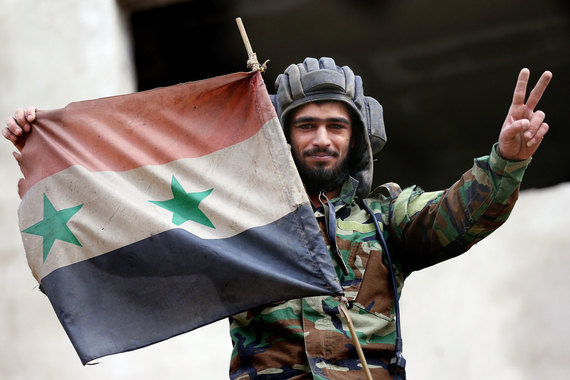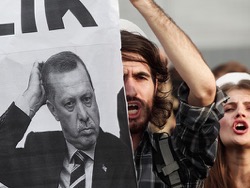
Why Turkey has all the prerequisites for a military coup
Where does Turkey regime of Recep Tayyip Erdogan? Why the Turkish army is fighting with the Kurds and whether to expect an invasion in Syria? Turkey will there be another military coup? About this at the seminar at the Moscow Carnegie center said the candidate of historical Sciences, associate Professor of the Institute of Asia and Africa of Lomonosov Moscow state University Pavel Shlykov. “Ribbon.ru” publishes the main points of his report.
The pursuit of leadership
Turkey is now in a very difficult situation. Ankara was faced with a dangerous combination of deepening political polarization of society, reducing economic growth, the escalation of tensions inside the country and abroad. Unlike political and economic instability of the 1970-ies and 1990-ies, the current internal Turkish crisis is largely the result of the conflict between the pragmatism of domestic and foreign policy of Ankara in the zero years and her current pursuit of leadership.
This crisis typical of new features:
— multi-level nature of the problems that have engulfed all spheres of public-political life of Turkey and all its public institutions;
— growing uncertainty about the future within a society, keenly feeling the exhaustion of the current socio-political model of the country;
— gradually increasing influence of the army and the possible threat of another military coup;
— the new format of the Kurdish question (in the South-Eastern part of Turkey is in fact now a smoldering civil war with the Kurdish armed groups);
— the impact of the war in Syria on domestic and foreign policy of Ankara.
— unclear political prospects of the ruling Party of justice and development and its informal leader, President Recep Tayyip Erdogan in the current situation.
The March of the Turkish army
How realistic is the return of the Turkish military elite in the political life of the country? Active intervention by the army in political processes has always been one of the features of recent Turkish history. During the previous decade, Erdogan openly declared the reformation of civil-military relations and conducted the appropriate course so that the military remained in the barracks and served as civil authorities, not dictate the political course. The military coup in Turkey is possible subject to simultaneous observance of three conditions: the strengthening of the internal political crisis in the country, the growing external threats and the sharp aggravation of the Kurdish problem. Now all these factors are obvious.
But after the collapse of the peace process with the leaders of the Turkish Kurds, Erdogan was forced to take a tactical Alliance with the military elite that he actively oppressed in 2007-2008. This was particularly evident in the fall of 2015, when the sweeps in the South-Eastern regions of the country predominantly populated by Kurds, the government granted the military command carte Blanche in the conduct of the operations. For the sake of situational Union army’s top Erdogan recognized the fallacy of the old course at ousting the military from the political life of Turkey, and even found guilty in their pursuit at the end of the zero years — living in Pennsylvania in self-imposed exile known Turkish preacher Gulen Fethullah.
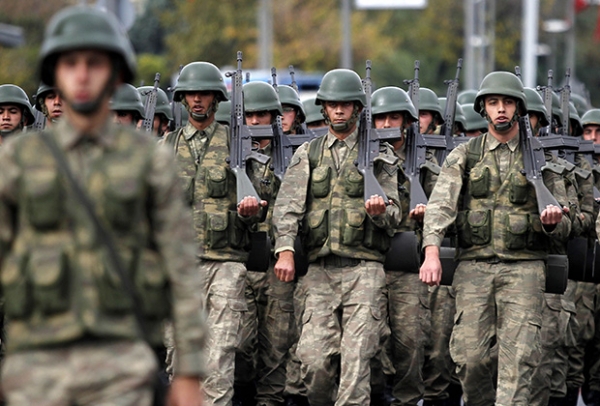
The Turkish military on parade in Istanbul. October 29, 2014
Photo: Huseyin Sari / Xinhua / Zuma / Globallookpress.com
Of course, the Turkish army and now maintains its status as the most influential political institution of the country, but it is unlikely (as in 1960, 1971 and 1980) will be solved in a military coup. The troops have full confidence in the support of the Turkish society. Army in modern Turkey important for the reason that in the current explosive situation, the generals paradoxically acts as a counterbalance to the risky foreign policy aspirations of Erdogan. A year ago, in the spring of 2015, the military with difficulty dissuaded him from invading Syria — the same thing happened in February 2016.
The fight with the Kurds
The Kurdish issue in its current bloody condition for over thirty years. It is estimated that Turkey is home to 15-20 million Kurds, about 15 percent of the population. The Kurdish minority historically has a high degree of dissociation.
Politically Turkish Kurds can be divided into three groups:
— nationalist supporters of the Kurdistan workers party (PKK), leading an armed struggle with the Turkish government;
— the Kurds, the alawites, supporting leftist and social democratic ideas and vote for the Republican people’s party of Turkey;
— religious-conservative majority (more than 50 percent of all Turkish Kurds) that in the zero years have demonstrated loyalty to Erdogan and his Party of justice and development party (AKP).
The support of a significant part of the Kurdish population of the RPS ideas were very useful to the Turkish authorities because he allowed them to show this loyal religious conservative majority beyond the Kurdish issue and to embed it in the existing socio-political system of the country. That all changed with the outbreak of war in Syria and the arrival there of the “Islamic state” (banned in Russia terrorist group — approx. “The tape.ru”) — the Kurds all of a sudden has shown the ability to national political consolidation.
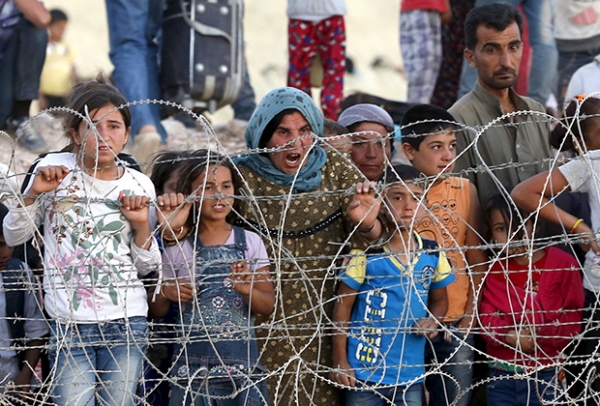
Refugees from the Kurdish town of Kobani on the border with Turkey on 25 June 2015
Photo: Murad Sezer / Reuters
After Ankara decided not to help IG besieged Kurdish city of Kobani on the Syrian-Turkish border, the religious-conservative majority of Turkish Kurds cooling off to Erdogan and his Party, justice and development. Even more disappointing is brought to coagulation observed during the last few years of dialogue between the government and Kurds and a return to military force in solving the Kurdish question.
An important factor in the increasing instability in Turkey — permeable from both sides of the 822-kilometer border with civil war-torn Syria. Jihadists are arriving in Turkey from a neighboring state, not only for treatment and recuperation (which often point of criticism of Erdogan), but also to commit terrorist acts, undermining the internal security of the country. But increasing threat to national security surprisingly does not contribute to the cohesion of the Turkish society, but on the contrary, only reinforce inside the division and political polarization. Unlike earlier times, military confrontation with the Kurds in the South-East of the country now finds no clear support among the Turkish public.
The Syrian trap
In 2015 the events in Syria developed in a extremely undesirable for Turkey’s direction, and after the incident in November, a Russian su-24 bomber Ankara finally lost his ability to somehow influence the situation in the neighboring country, actually being in its southern underbelly. In the last few weeks in the Turkish Pro-government media, much was made of the most favorable time for intervention in the Syrian conflict. However, these publications were designed mainly for domestic consumption — to mobilize a divided Turkish society. There are several reasons why Ankara is unlikely to intervene in Syria.
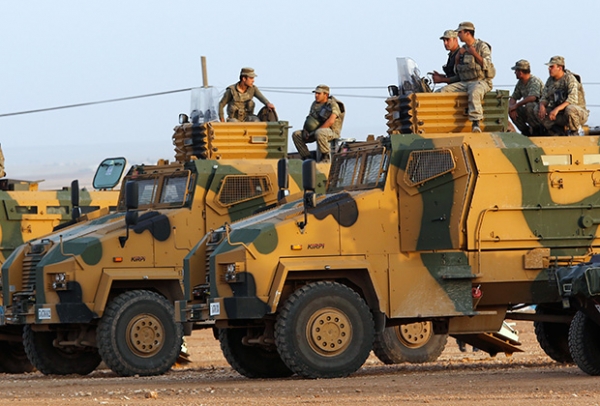
The Turkish military on the border with Syria. October 3, 2014
Murad Sezer / Reuters
First, even from a purely technical point of view, any modern military operation requires air cover. Now used by the Turkish army against Kurds Syrian artillery may not give the same benefits as aviation. The movement of troops is also better to carry out by air, because it is more secure and efficient. But now the sky over Syria in full control of Russia, and Moscow is unlikely to allow him in Turkish aviation.
Second, intervention in Syria is fraught for Ankara serious diplomatic complications. The intervention will support Saudi Arabia and other Persian Gulf States, but the inevitable conflict with the US and the West, not to mention Russia. Besides, during the invasion of Syria Turkish army will have to fight on several fronts: with the government forces of Bashar al-Assad, Islamic state, the armed opposition and, of course, the Kurds. There is no assurance that Erdogan is willing to take that risk.
Thirdly, getting involved in the Syrian civil war, Ankara will inevitably open a front in the rear in the Kurdish regions of South-Eastern part of the country. These relatively localized areas the fire of the Turkish-Kurdish armed confrontation may spread throughout Turkey, which is clearly shown by recent terrorist attacks.
A fork in the Turkish way
As the custom since the days of atatürk, who attempted the modernization and Westernization of the country to create a controlled opposition, all Turkish experiments with democracy are becoming bizarre. In the first years in power, Erdogan has launched a number of political and economic reforms, aimed at further rapprochement with the EU. What he was implemented in the country until 2007, the Turkish society was rightly perceived as modernization. But later, especially after large-scale constitutional reform of 2010, all the achievements of the previous decades has undergone revision and has been gradually rolled back.
Now Turkey is at a crossroads: either it will drift towards a super-presidential Republic, under the control of Erdogan, or will continue to evolve as a full-fledged liberal-democratic parliamentary system of the European type with its own characteristics.
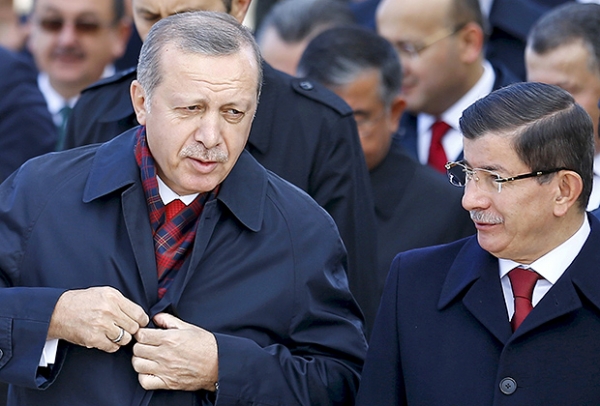
Recep Tayyip Erdogan and Ahmet Davutoglu
The choice of the way in Turkey traditionally largely depends on the personality of its leader. Under the current Constitution, the head of state is considered to be the Prime Minister and formal leader of the ruling AKP’s Ahmet Davotoglu, but in reality all power is concentrated in the hands of the President Erdogan.
Davotoglu is his protege and politically much weaker, therefore is forced to tolerate such things. If he found the political courage and the support of his fellow party members (which will be very difficult), will be able politely ask Erdogan to remain within the constitutional powers, the likelihood of development of Turkey by the European liberal ways will increase significantly.
Discord with Russia
After the incident with the Russian su-24 bomber in November 2015 Russian-Turkish relations is not just deteriorated and became openly hostile. In the short term, it is hardly necessary to expect any serious improvements.
There are three most probable scenarios:
— reconciliation in hot pursuit;
— Turkey’s agreement to sacrifice the restoration of good-neighbourly relations with Russia any politically significant figure with the announcement of her responsible for the incident on 24 November 2015;
— long road to reconciliation, in which due to the lack of compromise on both sides of the conflict situation over time.
While things are moving at a third option — we are witnessing a prolonged and deep conflict between Russia and Turkey, which will gradually subside after withdrawal from the political scene of his protagonists.

